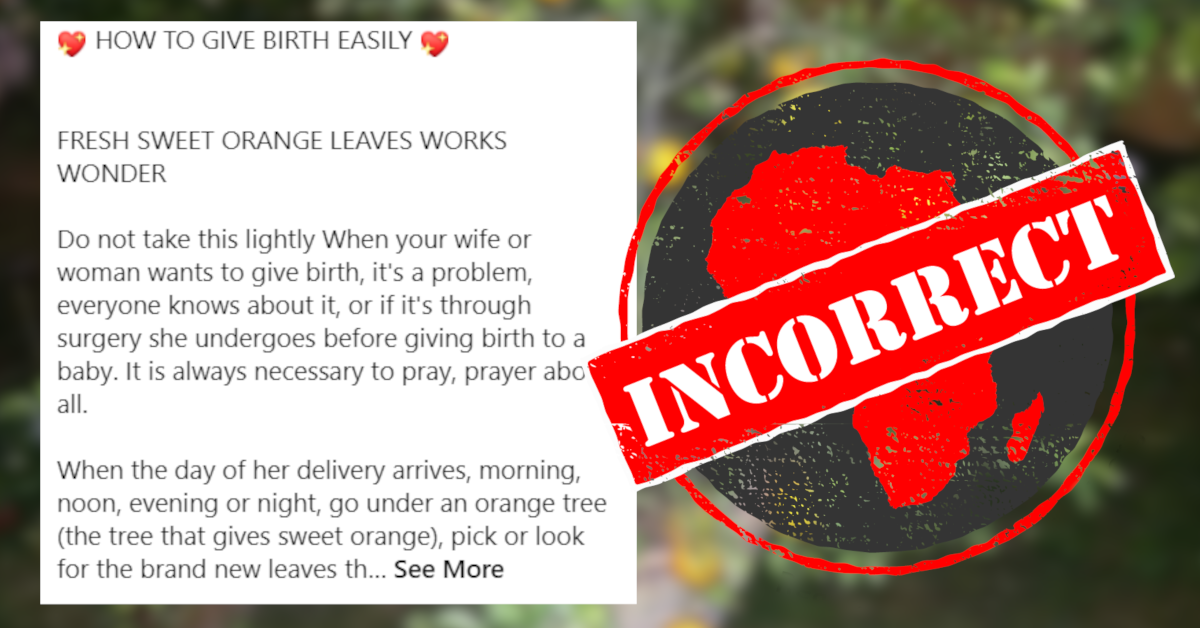“How to give birth easily,” reads the headline of a Facebook post shared in Nigeria in September 2020. It gives encouraging advice, claiming “fresh sweet orange leaves works wonder”.
“When the day of her delivery arrives, morning, noon, evening or night, go under an orange tree (the tree that gives sweet orange), pick or look for the brand new leaves that grow at the top, pluck few fresh lighter green ones wash and crush well, filter and collect the liquid,” the post says.
“Do not give her this at home; otherwise she gives birth immediately after taking the tea, it is at the hospital when she wants to go up on the delivery table that you will give her the tea to drink. The woman will give birth without any problem, even the fly that passes by won't even know.”
Will drinking the juice of orange leaves make childbirth problem-free?

“Pregnant women should disregard the claim,” Etim Ekanem, a professor of obstetrics and gynaecology at the University of Calabar in southern Nigeria, told Africa Check.
“We usually advise pregnant women not to consume herbal mixtures. It harms the child. The claim is not true. There are medical facilities – primary and tertiary health centres situated around the country – that one can walk into if one desires to get any information on childbirth,” Ekanem said.
“No one should consume any substance outside the prescribed drugs by a qualified medical practitioner.”
Adetokunbo Fabamwo, a professor of obstetrics and gynaecology in the clinical sciences faculty of Lagos State University’s college of medicine, agreed that women should disregard the claim.
“I would describe the claim as just a myth,” he said.
“I strongly advise against pregnant women consuming all sorts of things. It can be dangerous. It can cause deformation in their child. Pregnant women should stick to things they know and have been prescribed by a medical doctor.” – Motunrayo Joel
“When the day of her delivery arrives, morning, noon, evening or night, go under an orange tree (the tree that gives sweet orange), pick or look for the brand new leaves that grow at the top, pluck few fresh lighter green ones wash and crush well, filter and collect the liquid,” the post says.
“Do not give her this at home; otherwise she gives birth immediately after taking the tea, it is at the hospital when she wants to go up on the delivery table that you will give her the tea to drink. The woman will give birth without any problem, even the fly that passes by won't even know.”
Will drinking the juice of orange leaves make childbirth problem-free?

Pregnant women should avoid herbal mixtures
“Pregnant women should disregard the claim,” Etim Ekanem, a professor of obstetrics and gynaecology at the University of Calabar in southern Nigeria, told Africa Check.
“We usually advise pregnant women not to consume herbal mixtures. It harms the child. The claim is not true. There are medical facilities – primary and tertiary health centres situated around the country – that one can walk into if one desires to get any information on childbirth,” Ekanem said.
“No one should consume any substance outside the prescribed drugs by a qualified medical practitioner.”
Adetokunbo Fabamwo, a professor of obstetrics and gynaecology in the clinical sciences faculty of Lagos State University’s college of medicine, agreed that women should disregard the claim.
“I would describe the claim as just a myth,” he said.
“I strongly advise against pregnant women consuming all sorts of things. It can be dangerous. It can cause deformation in their child. Pregnant women should stick to things they know and have been prescribed by a medical doctor.” – Motunrayo Joel
Republish our content for free
For publishers: what to do if your post is rated false
A fact-checker has rated your Facebook or Instagram post as “false”, “altered”, “partly false” or “missing context”. This could have serious consequences. What do you do?
Click on our guide for the steps you should follow.
Publishers guideAfrica Check teams up with Facebook
Africa Check is a partner in Meta's third-party fact-checking programme to help stop the spread of false information on social media.
The content we rate as “false” will be downgraded on Facebook and Instagram. This means fewer people will see it.
You can also help identify false information on Facebook. This guide explains how.





Add new comment